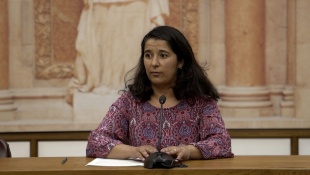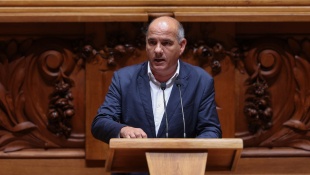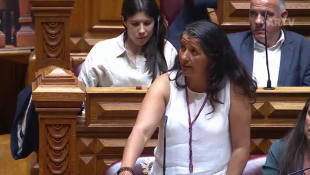Statement by Jerónimo de Sousa, Secretary-General of PCP
The new phase in the country's political life is characterized by the removal of the PSD/CDS government and by a new balance of forces in the National Parliament and has opened up new possibilities and created the conditions to address that most urgent issues and aspirations of the workers and the people .
It isn't just the case that the actions by PSD and CDS to turn the lives of the Portuguese into a living hell have been halted. With a decisive contribution from PCP, steps were taken to restore people's income and to give them back their rights, thus putting an end to the previous course of theft and looting .
Families and their homes were protected from tax execution procedures; teachers saw the dignity of their profession restored; the door was opened to restore and to establish the 35-hour week across public administration; the right to public transportation was upheld and the concession contracts for land transport companies were reverted; the holidays that had been supressed were restored; the National Minimum Wage was increased.
The State Budget for 2016 includes indications that the downward path of exploitation and impoverishment that had been imposed to the country in recent years is being reversed. Despite its limitations, they are signs that it is possible to put a stop to the stealing of rights and the assault on people's income. That is why big business has mounted a political and ideological attack against the State Budget.
Contrary to what happened in the past, the State Budget includes measures aimed at relieving the tax burden on workers. It reduces the additional tax and restores the wages that had been taken way. Social benefits for children, the elderly and the disabled have been bolstered. Access to healthcare has been made easier with the reduction in users' fees and the allocation of more doctors to the health services. Steps were taken to lessen the tax burden on workers, VAT for restaurants was reduced and households were protected with regard to the municipal real estate tax (IMI).
Notwithstanding its positive features, there are still many limitations and deficiencies in the State Budget that result from the choices made by the PS government. It is necessary and it is possible to go further and to do more. To go further and do more in increasing the real value of pensions; in public investment; in workers' wages and rights; in funding the healthcare system, education, social services and culture; in supporting, micro-, small and medium-sized companies and family-based farming; in taxing big businesses.
The choices made by PS, its unwillingness to distance itself from the interests of monopoly capital and to break away from the diktats of the European Union constrain and prevent the adoption of different policies that would address in a coherent and sustained manner the difficulties and challenges that the country faces as a result of decades of right-wing policies.
PCP will take part in earnest in the budgetary discussions in the parliamentary committees and will strive to make the Budget correspond as much as possible to the needs, expectations and aspirations of the workers and the people .
PCP will fight, in particular, to ensure that there is a real increase in pensions; that the numbers of those entitled to unemployment benefits is extended; that university fees are not raised; that the free-of-charge nature of school books is gradually introduced; that the IMI rate is reduced; that fiscal stimuli are provided for micro-, small- and medium-sized businesses; that workers contributions to the civil servants healthcare system (ADSE) and other public healthcare sub-systems are reduced.
PCP will express its opposition to various features of the State Budget, namely the restrictions imposed on workers and services in Public Administration and State-owned companies that have an impact on their income, professional advancement, contractual conditions and rights; the plan to award companies such as Silopor and IP Telecom to the private sector; the non-compliance with the law governing the financing of local authorities.
PCP will vote in favour of the State Budget in the overall vote. This vote derives from the assessment that PCP make of its overall context, development and political repercussions and of the positive features that we have noted in the draft Budget and that can adress some of the immediate issues faced by workers and the people.
The State Budget shows that with a significant contribution from PCP, it is possible to question the nature of that which big business claim to be inevitable; to open the door, albeit in a limited way, to solutions to existing issues and challenges; to point towards other routes and options; to generate hope and bolster the confidence in the struggle that was and will be undertaken by workers and the people for a Portugal that has a future as a country.
What the last few days have shown very clearly to the country and to the Portuguese people is that sovereign development, increased national production and the creation of jobs, justice and social progress that Portugal requires demand a break with the impositions of the European Union and other external constraints. That a solution to the countries difficulties and challenges is inseperable from a break with right-wing policies and the adoption of patriotic and left-wing policies.




